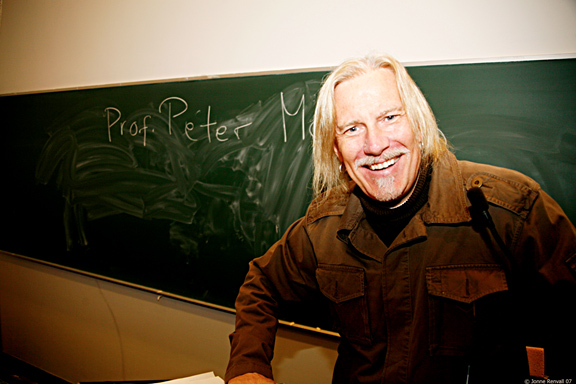Critical pedagogy guides reform of educational policy

UCLA Professor Peter McLaren is recognized as one of the leading architects of critical pedagogy worldwide. He was appointed to be honorary director of the Center for Critical Pedagogy Research at Northeast Normal University in 2015.
Over the past few years, the topic of educational equality has come to the fore in academia, raising public awareness. At the same time, new paradigms of critical pedagogy have been translated and introduced to China, attracting greater attention to the discipline.
Origination
Critical pedagogy is an important school of educational theory. It has many strands and theoretical foundations, but its origins are in many ways connected to Marxist theory. “The ‘critical’ aspect of critical pedagogy is considered a contribution of Marx. Critical pedagogy’s theoretical foundation is critical theory, based on Marxist theory,” said Yu Wei, a professor at Northeast Normal University.
The discipline has had a strong philosophical flavor since it first took shape in Germany in the 1960s. It was also influenced by the dispute over positivism within sociology. Huang Zhicheng, dean of the Institute of International and Comparative Education at East China Normal University, said critical pedagogy touches upon various profound social problems that are worthy of further consideration. In addition to pedagogy, it also involves disciplines like philosophy, sociology and psychology.
UCLA Professor Peter McLaren agreed that critical pedagogy serves as a huge umbrella for more than one or two strands. It is hard to define the discipline in broad terms, and no recognized definition exists, he said.
Advantages
Academic attention to critical pedagogy in China comes from a need for theoretical exploration and self-examination. “Chinese education has made huge achievements over decades of development. At the same time, we should keep looking at educational problems to promote quality and justice of education, thus completing educational reform by 2020. Critical pedagogy offers us a vital tool and perspective to examine the current problems in education,” Yu said.
Critical pedagogy has great potential to guide China’s education and curriculum. According to critical pedagogy, the teacher-student relationship should be defined based on a principle of equality, that is to say, education should be a two-way interaction. In terms of curriculum, critical pedagogy stands for thematic learning but opposes the over-categorization of textbooks.
Thematic learning integrates questions about many subjects into one curriculum. When teaching the word “slum,” for example, teachers should encourage students to think about why slums exist and why the sanitation there is terrible. In response, students would investigate these profound questions more deeply. “Curriculum of this type is more illuminating,” Huang said.
In critical pedagogy, learning is not only about acquiring knowledge. It is more about understanding society. The inability to think critically—commonly seen as a weakness of Chinese students—diminishes creativity and innovation, said Zhou Lin, an associate professor at Northeast Normal University in Changchun, Jilin Province.
Critical pedagogy gives people a fresh perspective on detailed teaching methodologies. It also provides a framework to guide the overall self-examination of education. Yu said there is an overwhelming opinion in China that the American educational system is perfect. But aren’t there any problems in American education? What are the shortcomings of Western education that reduce social mobility? Critical theory would help us understand better.
Prospects
From different disciplinary perspectives, researchers have introduced and discussed critical pedagogy in their research over the past few years. In 2015, the first session of the International Conference on Critical Pedagogy was held at Northeast Normal University. Scholars from the United States, Finland, Greece and other countries attended it. Its goal was to use critical pedagogy as a tool to enrich research and implementation of educational theories in China.
At present, research on critical pedagogy in China is still in the early stages. Most work is about introducing and understanding the discipline, Huang said. “Today, there are few experts and organizations wholly devoted to critical pedagogy research,” Yu said.
However, scholars in China embrace good theoretical foundation. “The academics should further explore and draw lessons from critical pedagogy to promote Chinese educational research,” Yu added.
Geng Xue is a reporter at the Chinese Social Sciences Today.
